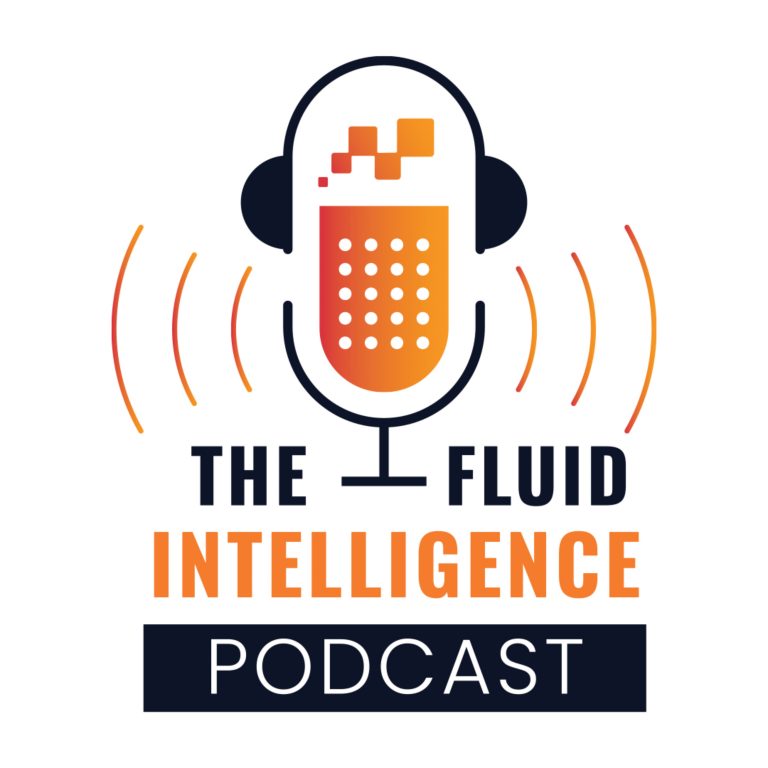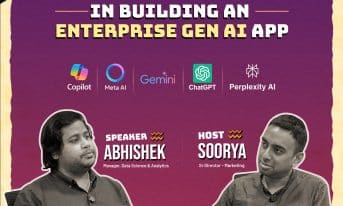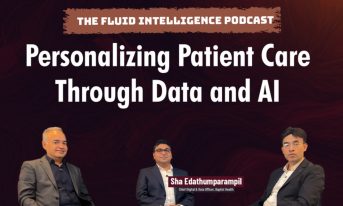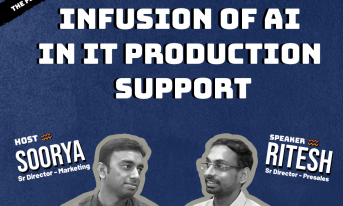The Fluid Intelligence Podcast
Hear it on Spotify

Welcome to The Fluid Intelligence Podcast, powered by Factspan! Dive into the dynamic fusion of data and AI with us. From the intricacies of Data Engineering to the innovations of Generative AI, we guide you through the data maze, making it easy for you to embrace fluidity and evolve your intelligence with confidence. Join us for a captivating exploration of the tech frontier!
To learn more about Factspan, visit www.factspan.com or email to contact@factspan.com
In this episode of the Fluid Intelligence Podcast, Akhilesh Yadav, Founder and CEO of Factspan Analytics, hosts Bidisha Sen, Chief Data Analytics Officer at Bayada Home Healthcare, and Glenn Hofmann, former Chief Analytics Officer at New York Life Insurance.
The conversation delves into the evolving role of data leadership, managing innovation, balancing regulatory compliance, and navigating the complexities of modern data-driven organizations. With their wealth of experience, Bidisha and Glenn share practical insights on decision-making, innovation pipelines, and talent acquisition strategies. Tune in for actionable advice on fostering collaboration and maintaining energy as a leader in the fast-paced data landscape.
Watch this podcast to explore how top leaders manage transformation while balancing business value creation, innovation, and regulatory demands.
Few key takeaways from the episode:
0:00 – Intro
5:15 – What was the first exciting data project you worked on?
12:00 – How have the roles of Chief Data Officers and Chief Analytics Officers evolved?
18:30 – How do you balance innovation, compliance, and business goals in regulated industries?
26:45 – Managing the tension between noise, innovation, and business value.
34:10 – Frameworks for decision-making in technology and talent acquisition.
48:00 – How do leaders maintain energy and optimism to inspire their teams?
Speakers:
Bidisha Sen: Chief Data Analytics Officer at Bayada Home Healthcare. She has driven data initiatives to improve patient outcomes while ensuring compliance in a heavily regulated industry.
LinkedIn: / bidishasen13 Glenn Hoffman: Former Chief Analytics Officer at New York Life Insurance, with extensive experience fostering innovation in the insurance sector while managing risk and compliance.
LinkedIn: / glennhofmann Host: Akhilesh Yadav: Founder and CEO of Factspan Analytics, a thought leader in data-driven decision-making and innovation in analytics.
LinkedIn: / akhileshyadav001 Additional Resources:
Learn about Factspan’s Data Engineering services: https://www.factspan.com/cloud-data-e…
FAQs on Data Engineering: https://www.factspan.com/blogs/faqs-o…
Blog: https://www.factspan.com/blogs/aws-da…Watch previous episodes:
Infusion of AI in IT Production Support: • Infusion of AI in IT Production Support
Personalizing Patient Care through Data & AI: • Personalizing Patient Care Through Da…
Challenges in Building an Enterprise Gen AI Application: • Technical challenges in building an e… Credits:
Producers: Soorya, Udit
Content Support: Vikram, Kruthika
Video Editing: Anees
About Factspan:
Factspan is a leading Data and AI company that empowers enterprises with end-to-end solutions across the Data and AI lifecycle. With expertise in data engineering, strategic analytics, and generative AI, Factspan partners with global organizations to unlock the power of data for business success.
Visit Factspan’s Website https://www.factspan.com/ for more information or contact us at contact@factspan.com.

Summary:
In this episode of the Fluid Intelligence Podcast, Akhilesh Yadav, Founder and CEO of Factspan, hosts Bidisha Sen, Chief Data Analytics Officer at Bayada Home Healthcare, and Glenn Hofmann, former Chief Analytics Officer at New York Life Insurance.
The conversation delves into the evolving role of data leadership, managing innovation, balancing regulatory compliance, and navigating the complexities of modern data-driven organizations. With their wealth of experience, Bidisha and Glenn share practical insights on decision-making, innovation pipelines, and talent acquisition strategies.
Tune in for actionable advice on fostering collaboration and maintaining energy as a leader in the fast-paced data landscape.
Full Transcript
Data and what they call digital transformation, data and AI are just part of an overall application or solution that creates or solves business problems. With generative AI and governance taking on new meaning, people are more concerned about how their data is being used and what they can share. The traditional approach to compliance and regulation in the healthcare world has evolved significantly.
The role of a Chief Data Officer is really about advocating for database decision-making at a company. The job can differ depending on the challenges faced, whether it’s infrastructure, data aggregation, or education. It’s about ensuring the company becomes more efficient, accurate, and competitive in the marketplace.
Welcome to the Fluid Intelligence Podcast. I’m Akhilesh Yadav, Founder and CEO of Factspan Analytics. Over the last decade, I’ve witnessed analytics evolve from a specialist tool to a fundamental driver of business value across industries. Today, we’ll dive deep into this transformation with two guests who are masters of their craft and familiar with these challenges.
My first guest is Bidisha Sen, Chief Data Analytics Officer at Bayada Home Healthcare. She has been pivotal in driving data initiatives to improve patient outcomes while managing regulatory requirements in the home healthcare industry.
My second guest is Glenn Hofmann, former Chief Analytics Officer at New York Life Insurance. He has been instrumental in fostering innovation in the traditional insurance industry while balancing risk management and compliance.
In today’s episode, we discuss navigating the tension between innovation, compliance, and maintaining the status quo. Our guests emphasize principles like advocacy, partnership, application, and education as essential drivers of change. Without further ado, let’s dive in.
Let’s start with an icebreaker. Glenn, what was the first exciting data project you remember in your career?
I’ve worked on many data projects, but one that stands out is digitizing old insurance records. It was a project where we went to a warehouse full of decades-old files, digitized them, and extracted valuable data. It wasn’t the kind of modern data work you’d think of, but it turned out to be a fascinating and valuable experience.
That’s fascinating! Converting paper files into digital formats. Bidisha, what about you?
Thank you, Akhilesh. It’s great to be here. One project that stands out is from when I was an entrepreneur. We were creating a digitized primary care portal for a tea garden. Everything was manual and paper-driven, and we assumed there would be basic internet connectivity. When we arrived at the site, we realized there was almost no connectivity, so we had to redesign the solution completely. It was a valuable lesson in not taking infrastructure for granted.
Both your experiences highlight how digital transformation involves solving real business problems, not just implementing technology. My early experience was with a tax project for a government agency. Watching how a tool transformed their workflow was deeply gratifying.
Evolution of Data Leadership Roles
How have you seen the roles of Chief Data Officers (CDOs) or Chief Analytics Officers (CAOs) evolve?
The role has shifted from managing data as a cost center to driving strategy and business outcomes. Earlier, data functions were about reporting and storage, but today they are integral to digital transformation. This role now has a seat at the table and contributes to strategic decisions.
I agree. The role has gained prominence, reflecting how critical data has become. Depending on the organization’s maturity, a CDO may need to focus on infrastructure, aggregation, community building, or advocacy. The ultimate goal is fostering database decision-making to improve efficiency, accuracy, and competitiveness.
That’s a common theme, this role has been elevated to an equal partner in business transformation
Balancing Innovation, Compliance, and Status Quo
How do you balance the tension between innovation, compliance, and maintaining the status quo, especially in regulated industries like insurance and healthcare?
Regulation is constantly evolving. Collaboration with legal and compliance teams is essential. I’ve worked closely with regulators to influence legislation and ensure feasible compliance processes. Education and communication are critical in aligning all stakeholders.
It’s about balancing like riding a bike, you can’t focus only on innovation or maintaining the status quo. Structured processes, governance councils, and cross-functional collaboration help balance these aspects. With generative AI, governance has taken on new dimensions, requiring continuous learning and adaptation.
Advocacy and education seem crucial, both internally and externally, to align stakeholders and drive outcomes.
Decision-Making Frameworks
What frameworks do you use for decision-making, especially for senior-level talent and technology stack decisions?
For projects, I evaluate based on three criteria: business value, stakeholder buy-in, and deployment feasibility. For larger decisions like technology stacks, it’s about involving diverse stakeholders, achieving consensus, and ensuring integration with the existing ecosystem.
The decision is often between “better and best,” not “good and bad.” I focus on partnerships, the company’s health, and alignment with business goals. Continuous innovation requires adaptability, as today’s best choice might not remain so in the future.
Leadership Energy Management
How do you manage your physical and emotional energy to lead effectively?
I prioritize managing energy over time. Practices like meditation, walking, and disconnecting help me recharge.
I stay naturally excited about both personal and professional projects. Finding exciting perspectives, even in mundane tasks, keeps me motivated.
That’s inspiring. For me, physical activity like walking and getting enough sleep are my go-to methods to reset.
Thank you, Bidisha and Glenn, for this enriching conversation. I’ve learned a lot from both of you, and I’m sure our listeners will too.
Thank you, audience, for tuning in. I hope you would have found this conversation insightful.
If so, please do subscribe to the channel by clicking on the Bell icon and do share the video with your colleagues and friends. If you have any topic suggestions, please drop your suggestions in the comment on the channel and also write to us at contact@factspan.com until then take care. See you soon.


